How to Become an SEO Health Writer: A 3-Level Training Roadmap to Build Your Freelance Health Writing Skills
If you're exploring freelance health writing, you’re probably in one of two situations:
Maybe you’ve already taken a small step, like completing a free challenge, following a short health writing course, or trying your hand at your first blog posts. You’ve learned the basics of SEO, but you’re still not sure whether you’re doing it right.
Or maybe you’re brand new and curious about how to become an SEO health or medical writer, but you’re overwhelmed by the number of skills you’re “supposed” to learn and you’re unsure where to start.
Wherever you’re starting from, one thing is true for almost every new health writer I’ve been working with as an SEO editor: Most writers learn the basics of SEO, then stop too early. They understand they need to place keywords, but they don’t really get why, and they don’t yet have the full workflow needed to feel confident they’re doing a good job. It’s because they don’t have a clear roadmap for developing the skills that matter specifically for SEO health writing.
I understand this situation because I was in the dark myself when I started my freelancing career back in 2022. After completing a few generic SEO courses like HubSpot, I still couldn’t find any relevant training specifically designed for health and medical writers.
That’s why I created a simple, beginner-friendly 3-level path based on everything I’ve learned when I started to offer SEO health writing services to then become an SEO editor, and everything I’ve now taught to nearly 100 writers.
This training roadmap will show you exactly where you are now, what SEO health writing skills you need next, and how to grow as a freelance SEO health writer without feeling lost or overwhelmed.
If you’ve already completed my 5-day SEO Health Writing Challenge, this will also show you your next step.
TL;DR: Your 3-Level Roadmap to SEO Health Writing
To become client-ready as an SEO health writer, you need strong health writing skills across three stages:
Level 1 : Build confidence with human search intent, empathy, and clear writing;
Level 2 : Strengthen SEO skills with keyword research, SERP analysis, structure, and E-E-A-T;
Level 3 : Grow your freelance practice with a portfolio, pitching, and pricing.
Use my 3-level training roadmap to discover your current stage, and if you want additional practice, join the 5-day health writing challenge (Level 1) or the mentorship program (Levels 1–3).
What Does “Client-Ready” Really Mean in SEO Health Writing (And Why So Many Writers Get Stuck)?
Client-ready in SEO health blog writing means being able to deliver a fully optimized health blog from brief to delivery confidently.
When you’re a beginner or even when you have some experience in SEO health writing, it can feel impossible to know whether you’re “good enough.” As freelance writers working solo, we want to follow best practices, but we’re simply not given the opportunity to benchmark our skills, which impacts our confidence (and therefore our rates), and makes imposter syndrome even harder to deal with.
You might be wondering:
Do I have the right SEO health writing skills?
Could I confidently call myself a freelance SEO health writer?
What am I missing that experienced SEO writers already know?
Am I competent enough to increase my rates?
Many new writers tell me they know some SEO, but very few know how to apply it in a way that delivers strategic, trust-building health content.
Here’s why that happens:
Most SEO trainings aren’t built for writers. They cover general content theory or focus heavily on technical aspects and backlinks, 90% of which you’ll never use as a writer or editor. After I completed a few of these courses, I still had no idea if I could take on a paid SEO project and if I’d be able to do things right (with hindsight: I didn’t, my first SEO blog posts were terrible, although I thought I was doing a good job…).
I found that these courses rarely walk you through a full health blog workflow writers need to follow. They don’t show you how to turn a health topic into a strategy-backed piece of content that meets editorial, medical, SEO standards, and is aligned with your client’s business objectives : everything we need to juggle with in real life when we receive a brief. And they definitely don’t prepare you to explain your choices to a client or editor, pitch or upsell your SEO services.
In practical terms, being client-ready means you can:
take a content brief (or know what to ask for when essential pieces of information are missing)
structure a health blog from start to finish (including picking a relevant angle and creating an outline only from a keyword)
optimize for search engines and AI in a way that still makes sense for readers and get results for your clients, without keyword stuffing or any other “SEO or GEO magic tricks” promoted online
apply E-E-A-T at the highest standards so your health content feels credible, empathetic, and medically responsible
explain your SEO choices clearly to clients or editors so that you become a trusted strategic partner,
feel 100% confident that your article is unique and is the most helpful out there (an incredible feeling when working on informational pieces for patients!)
Signs you’re not quite there yet (what I see when working with medical writers):
You can write a post, but struggle with coming up with a blog structure following a logical flow when you’re not given an outline.
You rely on AI to search for keywords and fill the gaps of your SEO knowledge
You don’t know what to look for in Google’s results pages (what’s called the SERP) and keyword research tools before writing.
You skip metadata, internal and external linking, image alt texts, or proper referencing because no one taught you how to do this correctly, and you may find this too technical.
You hesitate to pitch SEO writing services because you don’t feel confident enough. Don’t get me wrong: I still hate pitching, but by now I’ve seen my clients getting results from SEO and commissioning me every month for years, so it boosted my confidence that I am helpful to my clients and that they do get a return on investment, so I’ve increased my rates accordingly.
If any of the above resonated, it simply means you’re in what I call the gap zone: the space between learning basic SEO and having that practical experience that makes you feel you’ve become client-ready, or allows you to benchmark your skills if you’re more experienced. I know because I’ve been there myself: most SEO training courses aren’t designed for writers, let alone health writers.
The 3-Level Freelance SEO Health Writing Roadmap (Beginner-Friendly)
This roadmap helps you understand exactly where you are and what to focus on next, without trying to learn everything at once. It’s simple, practical, and aligned with how real SEO health blogs are written.
Level 1: Build Confidence (Where Most Beginners Start)
This is where you’re at if you’re fresh out of a course, or dipping your toes into SEO through a writing challenge.
At Level 1, you’re learning:
what human search intent is and how to choose reader-first topics
how to use BLUF writing (Bottom Line Up Front) for clarity
how to show empathy and use accessible language for sensitive health topics
how to add credible references to support trust and relevant CTAs (Calls to Action)
the basics of E-E-A-T (listing references properly)
the flow of a simple, SEO-friendly mini post
If you’ve completed my 5-day SEO health writing challenge, you are in this stage, and you already have the foundations.
The goal here is to publish your first SEO-friendly mini blog post and start building confidence. For many writers, this happens on LinkedIn, Medium, or their personal blog.
Success Stories from the Bioty Community from writers who completed the 5-day writing challenge (Level 1):
Kathleen Pachas, BSN, RN, a health content writer in the US, published her first mini-blog and said she finally understood how long a blog takes, and now has a repeatable framework she can use with clients.
Kathleen’s testimonials following the 5-day writing challenge
Mónica Faut, Ph.D., a health communicator from Argentina, shared that the step-by-step process helped her enjoy each stage of writing without feeling overwhelmed:
Mónica’s testimonial following the 5-day writing challenge
Ranee Harrison, Ph.D., a medical writer and science educator in the US, said the challenge felt like “a mini-course” and gave her enough confidence to volunteer as a medical reviewer for the next cohorts doing the writing challenge.
Ranee’s testimonial following the 5-day writing challenge
Fill in the form for a chance to join the next editions:
Level 2: Strengthen Your SEO Skills
Many beginners plateau at level 1 because they haven’t been taught how to apply SEO from a writer’s perspective. This is also the stage where most content gaps in health SEO writing show up. You’ve written a blog or two. Maybe you’ve picked a few keywords. But you’re still unsure how to craft an outline from scratch, handle a full client brief, or deliver a blog that checks every SEO box.
This level is about bringing strategy to your writing process. That means:
Doing proper keyword research and analyzing the SERP before you write.
Understanding how to structure a blog that flows logically and supports humans, Google and AI.
Mastering on-page SEO: internal and external links, subheadings, meta descriptions, alt texts, readability.
Learning how to reference research properly and collect expert quotes for E-E-A-T without overloading the reader.
Getting familiar with how AI tools surface health content and how to stay visible.
Understanding the basics of SEO analytics to create case studies and better manage clients’ expectations.
I cover some of these SEO best practices in practical workshops, where we dive deep into specific topics and present the latest updates in the field, including how to use AI ethically in medical writing.
By the end of this level, you should be able to confidently say: "I can deliver a complete, optimized blog post that meets a health brand’s SEO brief — and explain the strategy behind it."
Here’s what Australian science writer and medical editor Renae Crossing shared after completing the Bioty SEO mentoring. She explains how it transformed the way she chooses topics for health and science blogs :
Level 3: Grow as a Freelance SEO Health Writer (Your Business Foundations)
This stage goes beyond content and into the business side of freelance writing. Once you can deliver strong SEO health blogs and understand the skills of a good SEO writer that clients and SEO agencies actually evaluate, it’s time to work on visibility, confidence, and growth.
The next step is knowing how to:
Build a client-ready portfolio (guest blogs, blogs on your own site, or on free platforms).
Pitch SEO writing services clearly, including how to clarify briefs and set expectations.
Set your rates with confidence and know when (and how) to raise them.
Upsell SEO strategy or blog content packages when it makes sense.
Stay current with evolving practices like AI search behavior, Google updates, and what that means for health brands.
How the Mentorship Bridges the Gap
If Level 1 is about confidence, Levels 2 and 3 are about skills and strategy. This is exactly where my mentorship program helps you move forward. The idea is to DO more with real-world guidance, structure, and support.
The mentorship is not for you if you’re looking for a passive course: it’s hands-on, practical, and designed to meet you where you are. You’ll have to write a whole health blog from scratch (with my help).
The mentorship is built for beginners who want to:
develop full SEO writing skills
understand why something is optimized a certain way
follow a clear, writer-focused workflow
receive personalized feedback
build a client-ready portfolio
stop guessing and start applying
I have also had mentees who were experienced writers but wanted to benchmark their skills, such as Rachel who optimized her process:
Rachel’s testimonial after completing the Bioty SEO mentorship program. Extract from Rachel’s case study.
During the program, you’ll work with:
Real briefs and client scenarios, so you learn to write with purpose and complete practical exercises.
Templates and checklists that make blog structuring, keyword research, and linking easier.
1:1 support and expert feedback, so you’re never left wondering if you’re “doing it right.”
A workflow that’s flexible enough to fit your schedule — but structured enough to keep you accountable.
Whether you’ve enjoyed the free 5-day writing challenge or you’re just discovering this space, the mentorship is the next step if your goal is full client-readiness.
We go beyond Level 1 so you don’t get stuck rewriting one blog post over and over in the same way without knowing what you’re doing.
Instead, we cover:
The advanced writing and SEO skills you need in Level 2.
The freelance mindset, pricing, and pitching strategies in Level 3.
And how to stay future-ready, including how AI search is changing what content gets seen, and what that means for freelance writers.
It’s also part of a bigger path. This mentorship is designed to evolve with upcoming self-paced modules, webinars, and new resources to help you deepen specific skills or revisit parts of the roadmap on your own terms.
What If You’re Just Starting Out?
If you’ve never done a challenge or written a blog, start with one simple step:
Download the free SEO health blog checklist to get a feel for the key elements of search-optimized content.
Then, if you want guided practice, join the 5-day SEO Health Writing Challenge. It’s designed to help you move from hesitation to action. I’ll help you write your first short, SEO-friendly mini post with daily guidance and feedback. You’ll also join a private community of fellow health writers (and writers-to-be):
Private Bioty Community on LinkedIn made of mentees and challengers (65 members at the time of writing)
Here’s what past participants from the 5-day writing challenge said:
“Between days 2 to 4, my entire approach to writing online content changed.”
“It’s really more a resource-packed mini-course!”
“No one would have guessed it was a free challenge.”
Writers described it as the moment things started to click. Several even said it was the first time they truly felt like they belonged in health writing.
If you’ve already finished it, you’re ready for Level 2 and the mentorship will help you move into deeper skills.
And since you’re here, reading this, you're already further along than you think.
Final Thoughts: Are You Ready to Become a Client-Ready SEO Health Writer?
With the right support, you can move from feeling unsure or inconsistent to delivering strategic, credible SEO content with confidence. If that’s the direction you want to grow in, my SEO health writing mentorship was built for you.
Inside, you’ll get:
Personalized feedback on your writing and workflow
Real briefs, checklists, and templates to write smarter (not just harder)
Practical guidance to build a portfolio, pitch your services, and grow your confidence
Spots are limited to 1-2 mentees per month so that you receive personal attention.
Whether you’re building from scratch or leveling up, I’d love to support your next step. Let’s get you client-ready together.
Val ✍🏻
Your FAQs regarding SEO Health Writing Skills
-
The five essential skills map directly to the 3-level roadmap beginner health writers should follow:
Understanding human search intent (Level 1)
Writing with empathy and clarity (Level 1)
Doing keyword research and a full SERP analysis (Level 2)
Structuring a full SEO blog with headings, linking, metadata etc.(Level 2)
Applying E-E-A-T at the highest standards (Level 2)
-
Start by learning the foundations: search intent, empathy, clarity, and basic SEO. Then practice writing short SEO-friendly blogs, analyze the SERP before drafting, and build a small portfolio. My 3-level roadmap (and the 5-day challenge or mentorship program) can guide you through each step.
-
The best medical writing courses are those designed specifically for writers, not marketers or technical SEOs. Look for training that teaches practical blog workflows, E-E-A-T, SERP analysis, and real brief-to-delivery skills. My SEO Health Writing Mentorship Program is built for beginners who want hands-on guidance and personalized feedback instead of passive learning.
-
To improve your health writing skills, practice clear, patient-centred explanations, use plain language, review clinical sources carefully, and build empathy when needed. Start with short posts, follow a structured outline, and get feedback from an editor or mentor to refine tone, clarity, and accuracy.
About the Author
Valérie Leroux, MSc, is a bilingual SEO health writer and founder of Bioty Healthcare since 2022, helping health brands and medical writers create high-ranking, trustworthy content backed by science and empathy.

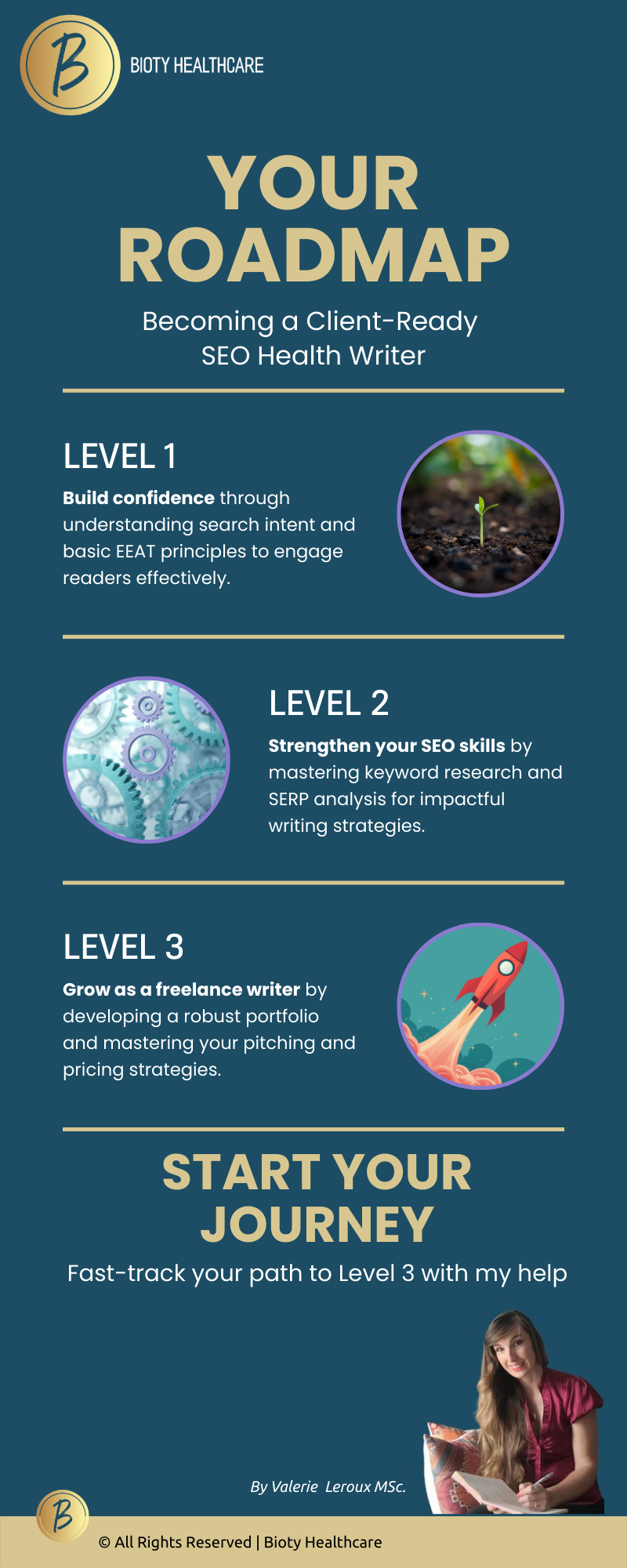
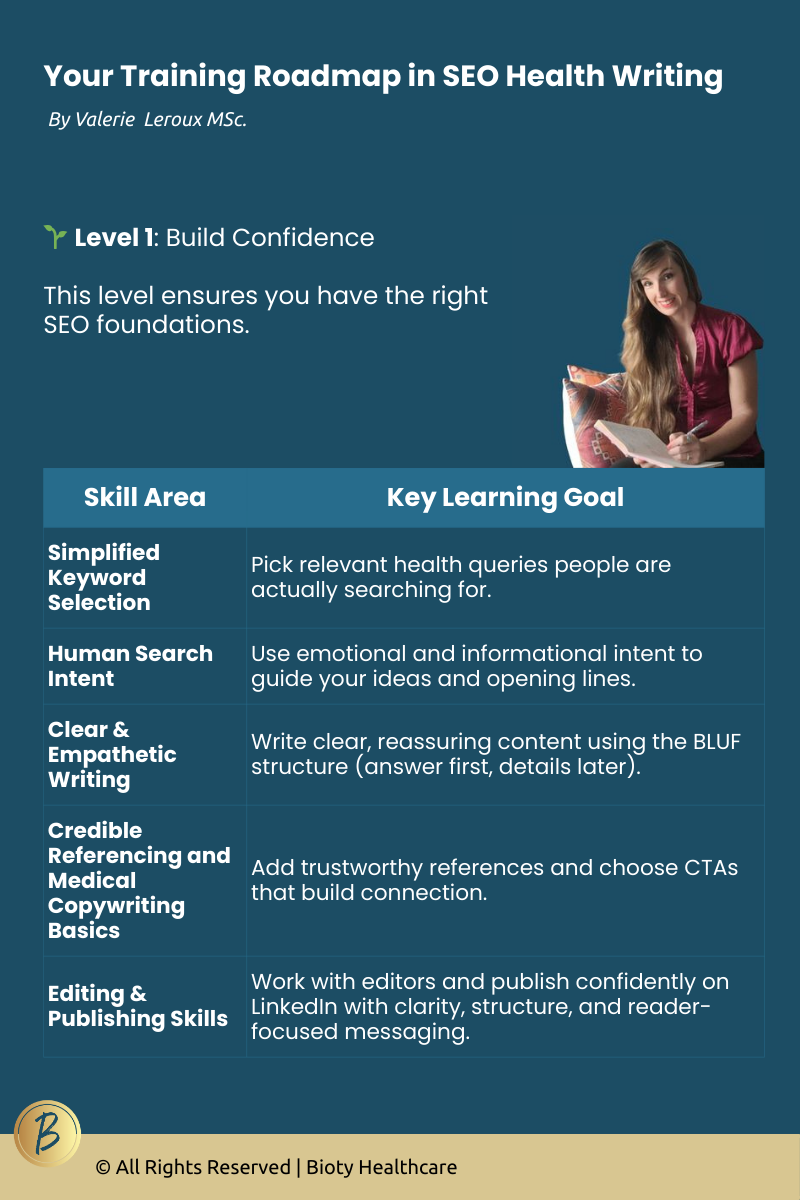



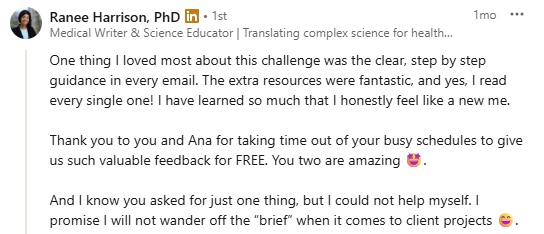
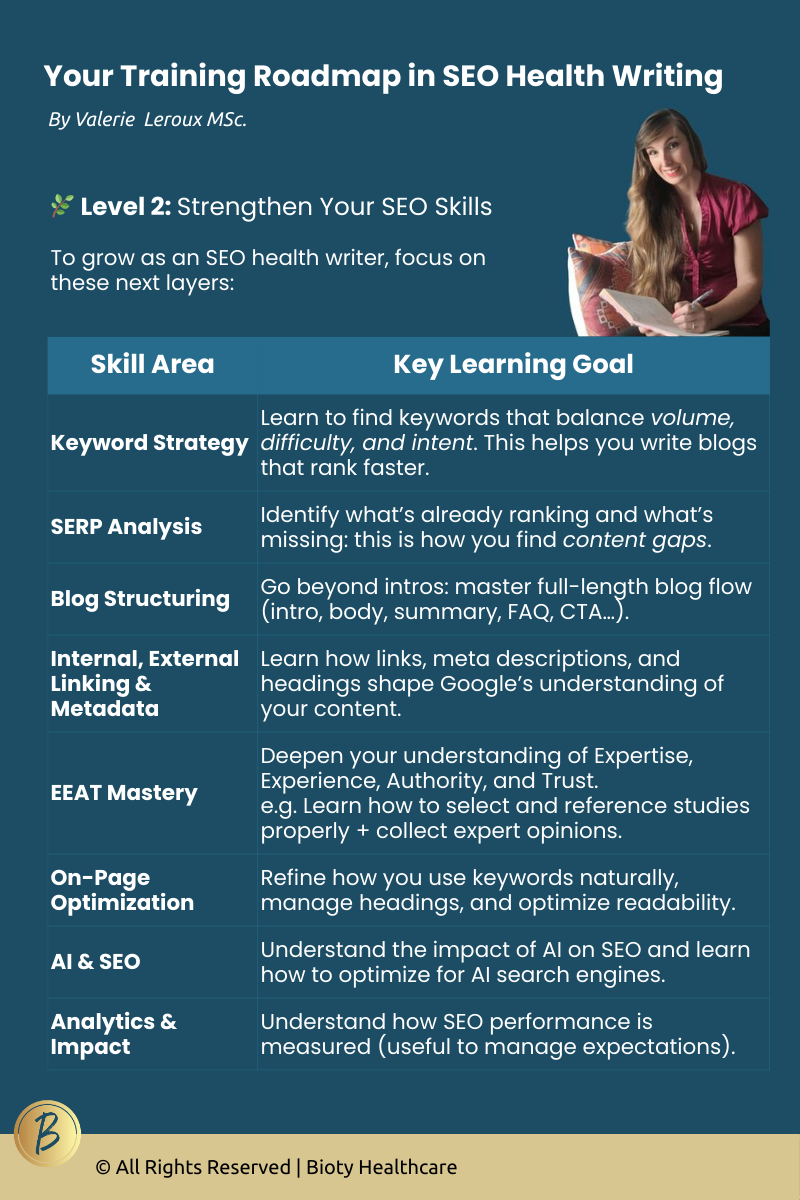


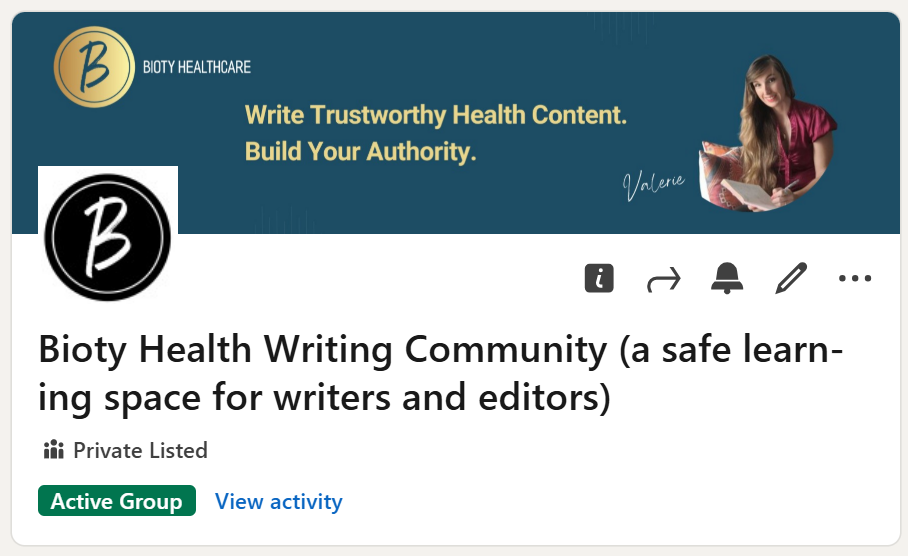


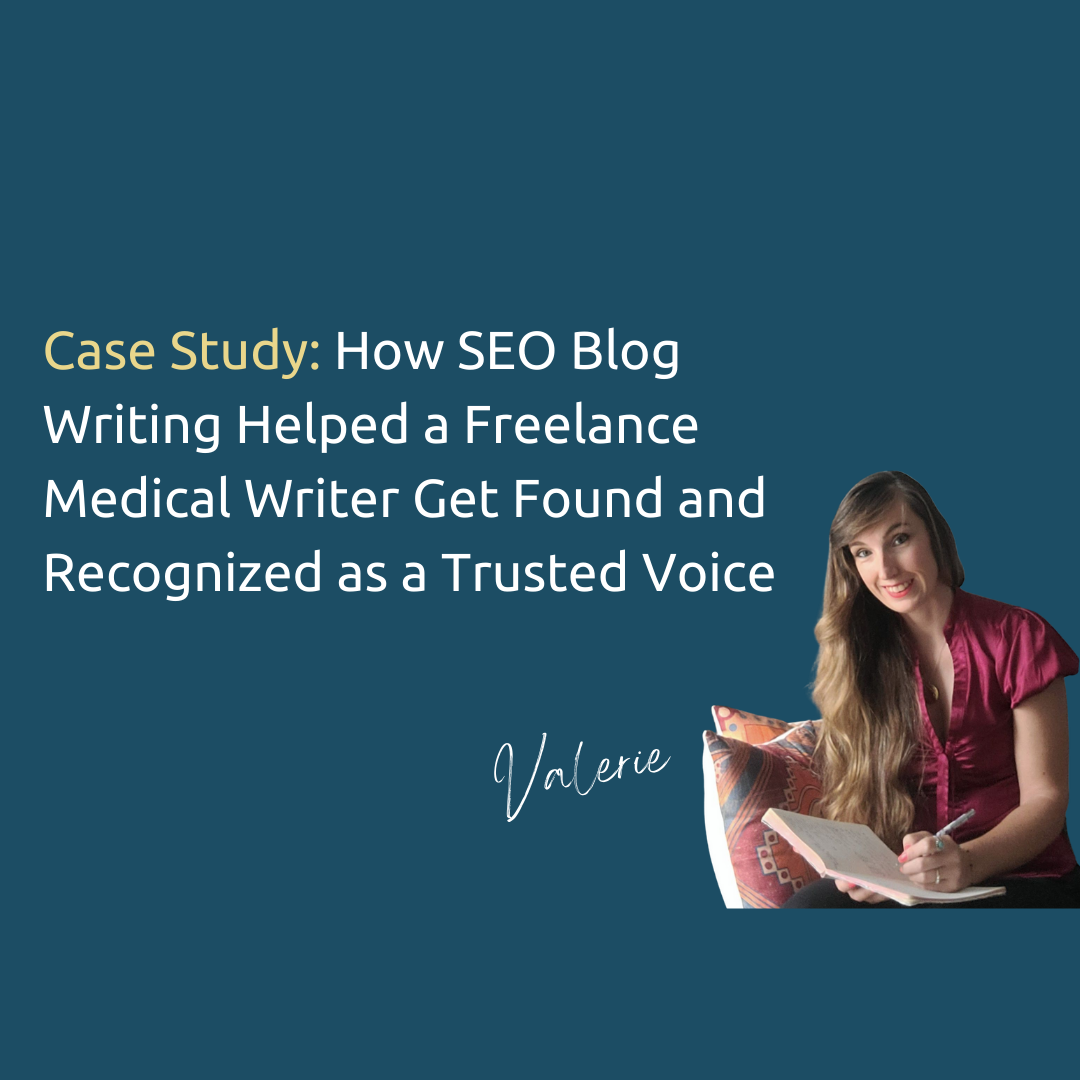








Not sure what to post on LinkedIn as a medical writer? Discover proven content ideas, what to avoid, and how to build credibility.